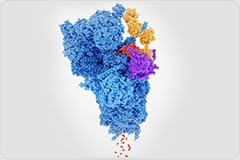|
| | September 16, 2019 | | | | | | | The latest genomics news from News-Medical | |
|
|
 | | |  dTag for Target Validation in Cancer dTag for Target Validation in Cancer
dTAG (degradation TAG) is an innovative approach to target validation, using heterobifunctional small molecule Degraders to harness a cell’s protein degradation system and eliminate a protein of interest. dTAG-13 has been used to identify and validate novel targets in cancer.
| |
|
|
|
|
 | | |  Scientists have used the gene-editing technology CRISPR in an attempt to cure a person infected with HIV. The team administered human stem cells that had been engineered to resist the virus. The attempt was successful, but only to a certain extent ̶ the edited cells have survived in the man’s body for more than a year and no side effects were detected. Scientists have used the gene-editing technology CRISPR in an attempt to cure a person infected with HIV. The team administered human stem cells that had been engineered to resist the virus. The attempt was successful, but only to a certain extent ̶ the edited cells have survived in the man’s body for more than a year and no side effects were detected. | | | | |  Scientists at Columbia University in New York have created a method that resolves two major problems commonly encountered in synthetic protein engineering. The method prevents a gene that encodes a synthetic protein from spreading into the wild and also stabilizes it so that it cannot mutate and lose its function over time. Scientists at Columbia University in New York have created a method that resolves two major problems commonly encountered in synthetic protein engineering. The method prevents a gene that encodes a synthetic protein from spreading into the wild and also stabilizes it so that it cannot mutate and lose its function over time. | | | | |  California state officials have passed the first law to prohibit genetic biohacking in an effort to regulate the controversial practice. The new law warns biohackers not to edit their own genes and makes it illegal to sell do-it-yourself genetic engineering kits unless they clearly state that they are not to be used for self-administration. California state officials have passed the first law to prohibit genetic biohacking in an effort to regulate the controversial practice. The new law warns biohackers not to edit their own genes and makes it illegal to sell do-it-yourself genetic engineering kits unless they clearly state that they are not to be used for self-administration. | | | | |  Scientists have found strong evidence that three genes from Lactobacillus species, a common bacterial species found in vaginal probiotics, can mediate adhesion to the vaginal epithelium. The research could pave the way for better treatments for women with conditions such as bacterial vaginosis. Scientists have found strong evidence that three genes from Lactobacillus species, a common bacterial species found in vaginal probiotics, can mediate adhesion to the vaginal epithelium. The research could pave the way for better treatments for women with conditions such as bacterial vaginosis. | |
|
|
|
|








No comments:
Post a Comment